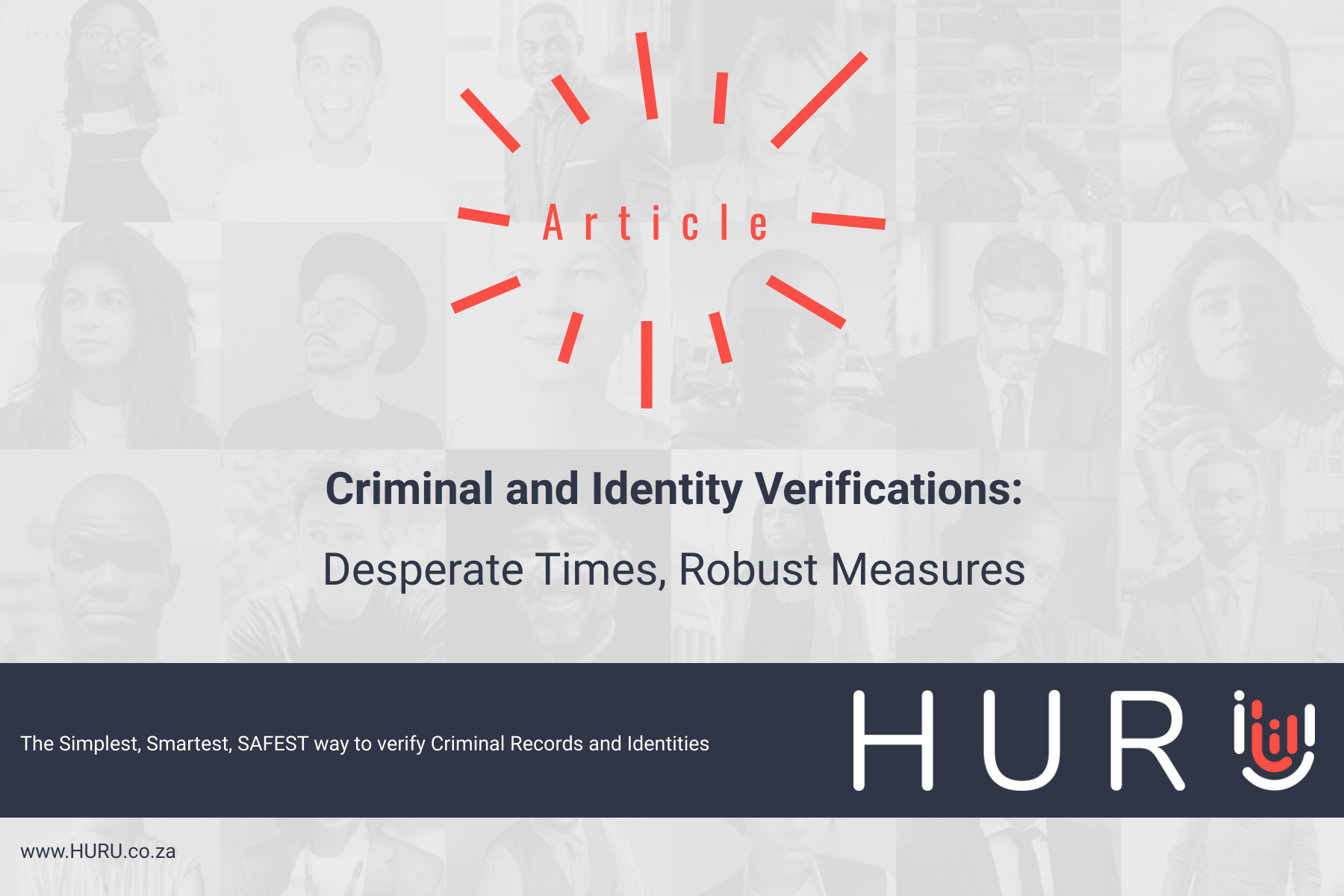
Published on June 24, 2020
“Doveryai, no proveryai” – Trust, but verify (Russian Proverb)
Perhaps a fitting ideology to consider during the hiring process, with unemployment in South Africa expected to rise to 50 percent in the next few months (and that’s an optimistic figure).
Adding to injury, any 5yr, 3yr, 12 month, 6 month (what the heck), even a 30-day plan has been swiftly obliterated by a tiny little virus called Covid-19. The gigantic effect of this global pandemic will plague our business environment for many years to come. Cashflows are strained beyond reprieve, and up till now, most businesses were either in a holding pattern or regrettably closed up shop for good.
Time is a major player in navigating the future of any enterprise during COVID-19. At present, Epidemiologists are rushing to predict its spread, governments shuffling to slow its progression and pharmaceuticals working around the clock to develop a vaccine. In response, businesses are forced to make rushed decisions, ditch long-term growth strategies, and generate reactionary plans at the drop of a hat, without the luxury of time on their side.
The Screening Landscape
Today, arguably the biggest crisis in South Africa, exacerbated by the government’s response to COVID-19, is joblessness. The soaring rate of unemployment has opened up an unprecedented conundrum regarding screening practices such as identity verification and criminal checks.
Companies are contemplating downscaling headcounts or, by now, have already retrenched staff in the hope that they will be able to rehire them when lockdown levels are lifted, and consumer demand escalates once again.
On the other hand, certain industries for example healthcare, sanitation and essential services require a quick uptick of worker numbers, resulting in mass hiring and onboarding taking place in record time in anticipation of new market demand.
Penny Wise, Pound Foolish
A significant consideration is, of course, managing cash flow and budgets, with concerted efforts being made in cutting expenses down to the bare minimum, to ensure survival over the medium term regardless of downscaling or upscaling.
Two scenarios are at play here:
1. Companies are paying for a background screening service and contemplating cancelling the subscription
2. Companies not currently subscribed for background screening solutions are avoiding adding extra expenses to the budget at this point
Unfortunately, these cost-cutting trends seem to be penny wise but pound foolish, where screening and verification expenses are perceived as non-essential but may very well be the worst business decision during these desperate times.
Not having it, when you need it
In crises such as recessions, market crashes or pandemics, risk-mitigating products are usually the first to go. Let us consider insurance products for example, disability cover, temporary dreaded disease, medical aid, armed response, or general insurance.
It is a well-known fact that recessions, war conflicts, market volatility and pandemics prompt, immediate changes in spending behaviours, where risk products are typically the first to be scrapped off the budget to increase cash flow for other items deemed “more” essential.
Screening and vetting solutions are often viewed as a nice to have as opposed to a crucial risk management expense. Saving costs by unsubscribing to verification services now, may come back biting in the future.
Imagine a situation where the safety of employees is in jeopardy due to a worker succumbing to workplace violence and sexual harassment. Or, an instance where the company’s financial longevity is compromised by an individual committing fraud. Even consider having the company’s reputation in tatters, because someone posted unsavoury commentary that ended up going viral in the social media universe.
The costs of lawsuits, workplace liability claims, fixing reputational damage or recouping funds from fraud or white-collar crime, outweigh the costs of verifications and screening checks exponentially. To place this in perspective: a lawsuit may amount to millions versus a comprehensive verification check usually costing few hundred rand. You do the math.
Why is proper vetting and screening even more crucial right now?
Taking Shortcuts, is Taking Risks
The economy is opening up, and businesses are picking themselves up by the bootstraps. Some are already pivoting in terms of product lines and service solutions gravitating towards current in-demand services and products. For example, textile factories are producing masks, gloves and protective clothing, engineering manufacturers venture into medicinally aligned products like testing equipment or mobile clinics, and automotive manufacturers moved from producing cars to making ventilators. Such strategic pivots may require mass hiring directives in the short to medium term.
With lockdown regulations being downscaled to Level 3 as from June, the majority of South African organisations would be able to operate, subject to increased health and safety regulations.
You may not have the funds right now to offer permanent contracts, but hiring remote workers, contract workers, and temporary workers to satiate the customer demand may be a viable strategy to follow. To limit the risk to your company and employees, you need to know whom you are hiring – aka KYC (know your candidate).
It is tempting to circumvent a comprehensive screening process and hire workers without conducting background screening or before receiving the results of verification requests. However, it is crucial to recognise that the cost of a bad hire, could impose irreparable damage to your company, employees, customers and the broader community. This is particularly relevant to staff that work directly with the general public and vulnerable populations.
Employers are legally bound to ensure that prospective employees do not present a danger to their clients, employees, or company viability. Therefore, skipping, or diluting screening strategies during times of adversity is not an option.
Screening Checkpoints
The three primary reasons for conducting robust background screening are as follows:
· Safety – Avoid harm or legal liabilities from becoming to internal or external parties of the company ecosystem, for example actions like workplace violence, sexual harassments, negligent driving, financial fraud, cybercrime, and corporate espionage.
· Productivity – Past performance is indicative of future performance in terms of productivity, skills, knowledge, and professionalism. Proper vetting assists in distinguishing between high achievers and posers
· Data Integrity – Verifying personal particulars, academic credentials, and employment history, provide insight to a candidate’s reliability, integrity, and motivation. A report by HireRight uncovered that 85% of employers discovered misrepresented or inflated information on applicant’s resumes as a result of screening activities. For South Africa specifically, this is a statistic to take note of, considering our spiking unemployment rates will be causing candidates to become increasingly desperate and willing to do whatever it takes to secure a job (including providing false information).
All of these considerations underscore the need for companies to adopt quick, thorough background checks, especially during a crisis and under challenging circumstances.
Desperate Times, call for Desperate Measures (or does it?)
Background screening and biometrics (fingerprint capturing) service providers have been operating since April under Level 4 Lockdown Regulations and allowed to service any company who can trade under the relevant alert level.
With most industries returning to operations in June, vetting and checking should rank high on the hiring ‘’to-do list”. In an environment where each transaction, project, tender or subscription is crucial to business survival, cutting corners when hiring is, well, a risky business regardless of how promising a candidate may seem.
While COVID-19 has transformed the way employers execute hiring strategies, employers should not be dissuaded by time-to-hire from ensuring the safety and security of their workforce and preserving the validity of their businesses. Desperation breeds innovation, and in this age of the #newnormal, adapting to challenges is essential for enterprise sustainability.
Avoid abandoning screening practices and in the process sacrificing Employer Branding, Employer Value Proposition and Company Reputation perceptions in the process.
For more information please contact us:
www.HURU.co.za
This email address is being protected from spambots. You need JavaScript enabled to view it.











